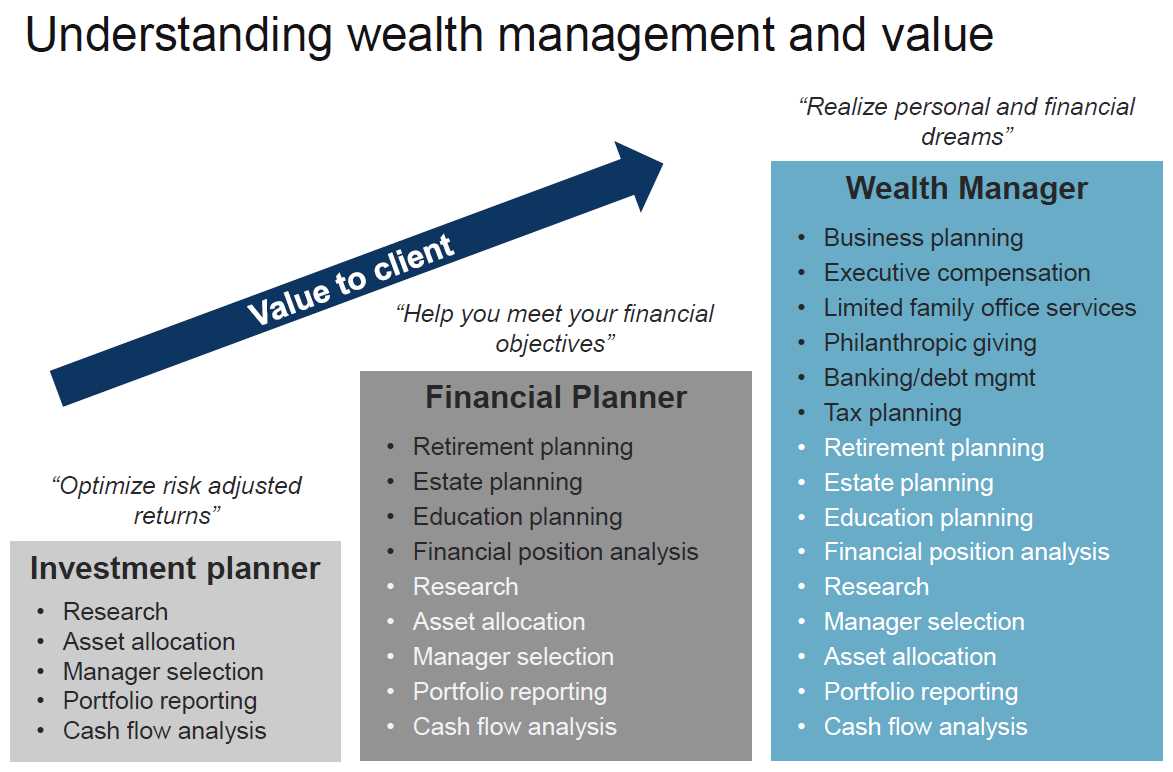What is Wealth Management?

Wealth management is a comprehensive financial planning and investment advisory service that helps individuals and families achieve their financial goals. It involves analyzing a client’s current financial situation, identifying their long-term objectives, and creating a customized strategy to manage and grow their wealth.
Unlike traditional banking services, wealth management goes beyond basic financial transactions and focuses on providing personalized advice and guidance. It takes into account various aspects of a client’s financial life, including investments, retirement planning, tax optimization, estate planning, and risk management.
Wealth managers work closely with their clients to understand their unique needs and develop a tailored financial plan. They provide ongoing support and advice, helping clients navigate through complex financial decisions and make informed choices.
By leveraging their expertise and knowledge, wealth managers aim to optimize their clients’ financial well-being and help them achieve their financial goals. They provide access to a wide range of investment opportunities, monitor portfolio performance, and make adjustments as needed to ensure the best possible outcomes.
In summary, wealth management is a holistic approach to financial planning that combines personalized advice, investment management, and ongoing support to help individuals and families build, preserve, and grow their wealth.
Wealth management services offer a range of financial solutions to help individuals and families achieve their financial goals. These services are designed to provide personalized advice and guidance to clients, taking into account their unique circumstances and objectives.
Some of the key services offered by wealth management firms include:
| Investment Management | Wealth managers help clients develop and implement investment strategies tailored to their risk tolerance and financial goals. They provide expertise in selecting and managing a diversified portfolio of assets, including stocks, bonds, mutual funds, and alternative investments. |
|---|---|
| Financial Planning | Wealth managers work with clients to create comprehensive financial plans that address their short-term and long-term financial needs. This includes budgeting, retirement planning, tax planning, estate planning, and risk management. |
| Retirement Planning | Wealth managers help clients prepare for a comfortable retirement by developing strategies to maximize savings, minimize taxes, and optimize Social Security and pension benefits. They also provide guidance on investment allocation during retirement to ensure a sustainable income stream. |
| Estate Planning | Wealth managers assist clients in creating an estate plan that ensures the smooth transfer of assets to future generations while minimizing estate taxes. This includes the creation of wills, trusts, and other legal documents. |
| Tax Planning | Wealth managers help clients minimize their tax liabilities through strategic tax planning. They stay up-to-date with the latest tax laws and regulations to identify opportunities for tax savings, such as tax-efficient investment strategies and charitable giving. |
| Insurance Planning | Wealth managers analyze clients’ insurance needs and recommend appropriate insurance solutions to protect their assets and mitigate risks. This includes life insurance, disability insurance, long-term care insurance, and liability insurance. |
By leveraging these services, individuals and families can benefit from professional expertise and guidance to make informed financial decisions and optimize their wealth accumulation and preservation strategies.
Exploring the Fees

- Management Fees: Wealth management firms typically charge a percentage of the total assets they manage on your behalf. This fee is usually calculated annually and can range from 0.5% to 2% of your portfolio’s value.
- Performance Fees: Some wealth management firms also charge performance fees based on the returns they generate for you. These fees are usually a percentage of the profits earned and are in addition to the management fees.
- Transaction Fees: Wealth management firms may charge transaction fees for buying or selling securities on your behalf. These fees can vary depending on the type and size of the transaction.
- Custodian Fees: If your wealth management firm uses a custodian to hold your assets, there may be custodian fees involved. These fees cover the cost of safekeeping and administering your investments.
- Advisory Fees: In addition to the management fees, some wealth management firms charge advisory fees for providing personalized financial advice and guidance. These fees are usually charged separately and can be based on an hourly rate or a fixed fee.

Emily Bibb simplifies finance through bestselling books and articles, bridging complex concepts for everyday understanding. Engaging audiences via social media, she shares insights for financial success. Active in seminars and philanthropy, Bibb aims to create a more financially informed society, driven by her passion for empowering others.
